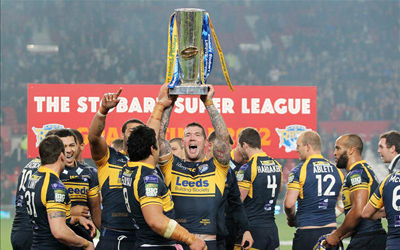Super League to Revert to 12-Club Structure in 2015
July 11, 2013
The rugby Super League will be a 12-team competition from 2015, removing the 14-team structure that is currently in place.
The move came after the clubs finally ruled out the option to go down to 10 teams at their annual meeting in Bradford.
In June Super League clubs agreed to reduce the current 14 team structure and remove the current licensing system for a promotion and relegation structure.
Two proposals remain unresolved after the annual meeting, with the first being for two divisions of 12 with a promotion and relegation system between the two.
Alternatively, the Rugby Football League (RFL) wants to see Super League and a 12-team Championship split after 23 games into three qualifying play-off groups of eight clubs.
Nigel Wood, chief executive of both the RFL and Super League, said: “The clubs engaged in a robust and frank debate about the future of their competition and gave their full support to the RFL executive in our search for the most compelling league structure.
“It is apparent that there is a strong and widespread desire to deliver a really exciting league season that provides well-run clubs at all levels of the game with opportunities to flourish, succeed and make progress.
“Our task now is to drill down into the details of a range of issues such as minimum standards, financial distributions and the various mechanics around promotion and relegation.”
Declining crowds
The reorganisation of the league is designed to stop falling revenue and declining crowds.
St Helens’ Jon Wilkin, chairman of the Super League Players’ Association, saw the news as a positive.
He explained: “Some change is required in the competition structure. When you’ve got a relatively restricted player pool you have to sort a lot of players from overseas.
“We were probably overstretching our resources and this is an opportunity to make the competition more intense, commercially viable and sustainable – and that’s what’s probably in the players’ best interests in the long term.
“Promotion and relegation is something associated with British sport. Some clubs have a rich history and have been an integral part of the game so it’s good to have access back to the top flight.
“It’s a positive step for the game, if tied up with a strong commercial plan.”


